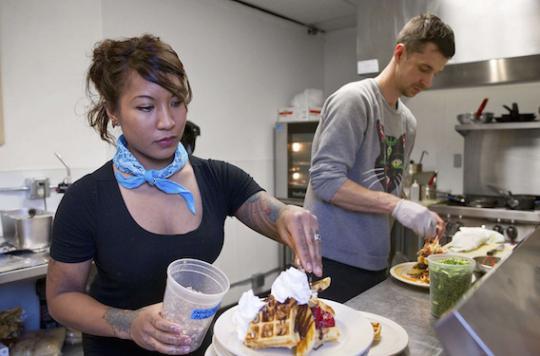In order to better inform consumers, the new version of the “homemade” decree entered into force on Friday. Restaurant owners complain about the constraints.

With too much fat and added sugars, the meals that some American mothers offer to their children leave something to be desired. According to researchers from Virginia Tech (Blacksburg), this “homemade” very often corresponds to industrial cooking where the nutritional quality is even less good than in school restaurants across the Atlantic.
This disappointment on the merchandise does not however only concern American households, since French restaurateurs also play the game of non-transparency vis-à-vis their customers. A lie that will soon end, sincea decree simplifying the label Home made in the restoration came into force this Friday.
Cooked on site from raw products
After being published on May 7 in the Official Journal (OJ), the mention “homemade” now concerns a dish fully cooked on site and from raw products. As a reminder, the initial version of the label specified that to be “homemade”, the dishes served must have been prepared in the kitchen from raw products. This denomination included pre-cooked industrial products and in particular vacuum-packed and frozen fruits and vegetables in the kitchen of restaurateurs.
Now, these ingredients will therefore have to be raw for the dish to be considered “homemade”. However, the legislator has provided for an exception to this principle, products which the consumer does not expect to be prepared on the spot such as pasta, bread or cheese.
A headache to come with the allergens decree
In Le Figaro Carole Delga, Secretary of State for Trade, Crafts, Consumption and Social and Solidarity Economy, confides that “the two objectives of this revised decree are to recognize the cuisine of dishes made on site and to provide a guarantee of transparency for the consumer on the authenticity of the cuisine produced by restaurateurs ”.
However, this law does not make restaurateurs happy, faced with a real headache. From July, in fact, restaurants will be obliged to indicate all the allergens present in their dishes, “homemade” or not. “This allergenic decree will pollute the label Home made “, deplores in the same daily Didier Chenet, president of Synhorcat union (1).
“Have a sauce made from fresh produce in a restaurant. The chef is unable to list all the allergens present in all the ingredients of his sauce. A large number of restaurateurs then risk turning to products from the food industry and on the packaging of which all the allergens are already specified. the Homemade will be thus sacrificed in the name of respect for the decree on allergens, ”he concludes.
As a reminder, the logo or the mention designating the Home made must be placed visibly on information media (menus, maps, websites, etc.)
(1) National Union of Hoteliers, Restaurateurs, Cafetiers and Caterers
.
















